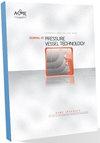Methods For Estimating Hydrogen Fuel Tank Characteristics
IF 1.4
4区 工程技术
Q4 ENGINEERING, MECHANICAL
Journal of Pressure Vessel Technology-Transactions of the Asme
Pub Date : 2023-10-27
DOI:10.1115/1.4063884
引用次数: 0
Abstract
Abstract The pressure vessels needed to store hydrogen for next-generation hydrogen fuel cell vehicles are expected to be a substantial portion of the total system mass, volume, and cost. Gravimetric capacity, volumetric capacity, and cost per kilogram of usable hydrogen are key performance metrics that the U.S. Department of Energy (DOE) uses to determine the viability of hydrogen fuel cell systems. Research and development related to hydrogen storage systems covers a wide range of potential operating conditions, from cryogenic temperatures to high temperatures (above ambient) and low pressure to high pressure. Researchers at PNNL have developed methods for estimating these key pressure vessel characteristics to support on-board hydrogen storage system design and performance evaluation and to support decision-making about DOE's hydrogen storage system research investments. This article describes the pressure tank estimation methodology that has been used as a stand-alone calculation and has been incorporated into larger system evaluation tools. The methodology estimates the geometry, mass, and material cost of Type I, Type III, and Type IV pressure vessels based on operating pressure and material strength at the system's operating temperature, using classical thin-wall and thick-wall pressure vessel stress calculations. The geometry, mass, and material cost requirements of the pressure vessel have significant impacts on the total system performance.氢燃料箱特性的估计方法
为下一代氢燃料电池汽车储存氢气所需的压力容器预计将占整个系统质量、体积和成本的很大一部分。重量容量、体积容量和每公斤可用氢的成本是美国能源部(DOE)用来确定氢燃料电池系统可行性的关键性能指标。与储氢系统相关的研究和开发涵盖了广泛的潜在操作条件,从低温到高温(高于环境温度),从低压到高压。PNNL的研究人员已经开发出估算这些关键压力容器特性的方法,以支持机载储氢系统的设计和性能评估,并支持美国能源部储氢系统研究投资的决策。本文描述了压力罐估算方法,该方法已被用作独立计算,并已并入更大的系统评估工具中。该方法基于系统工作温度下的工作压力和材料强度,使用经典的薄壁和厚壁压力容器应力计算,估算I型、III型和IV型压力容器的几何形状、质量和材料成本。压力容器的几何形状、质量和材料成本要求对整个系统的性能有重大影响。
本文章由计算机程序翻译,如有差异,请以英文原文为准。
求助全文
约1分钟内获得全文
求助全文
来源期刊
CiteScore
2.10
自引率
10.00%
发文量
77
审稿时长
4.2 months
期刊介绍:
The Journal of Pressure Vessel Technology is the premier publication for the highest-quality research and interpretive reports on the design, analysis, materials, fabrication, construction, inspection, operation, and failure prevention of pressure vessels, piping, pipelines, power and heating boilers, heat exchangers, reaction vessels, pumps, valves, and other pressure and temperature-bearing components, as well as the nondestructive evaluation of critical components in mechanical engineering applications. Not only does the Journal cover all topics dealing with the design and analysis of pressure vessels, piping, and components, but it also contains discussions of their related codes and standards.
Applicable pressure technology areas of interest include: Dynamic and seismic analysis; Equipment qualification; Fabrication; Welding processes and integrity; Operation of vessels and piping; Fatigue and fracture prediction; Finite and boundary element methods; Fluid-structure interaction; High pressure engineering; Elevated temperature analysis and design; Inelastic analysis; Life extension; Lifeline earthquake engineering; PVP materials and their property databases; NDE; safety and reliability; Verification and qualification of software.

 求助内容:
求助内容: 应助结果提醒方式:
应助结果提醒方式:


